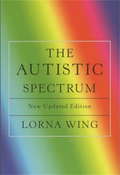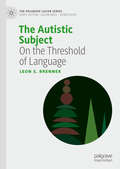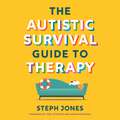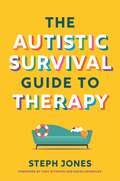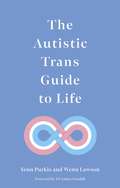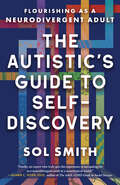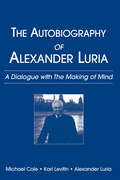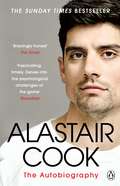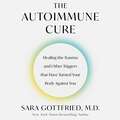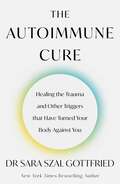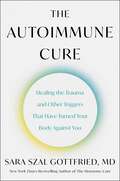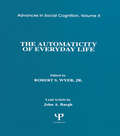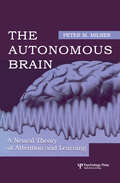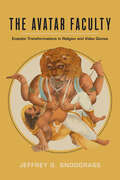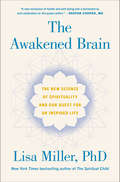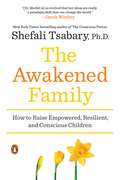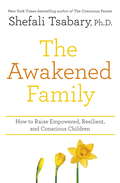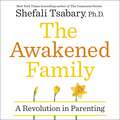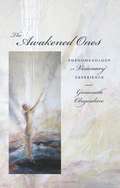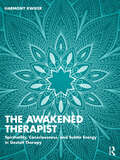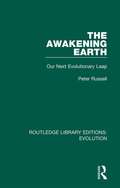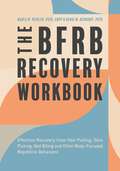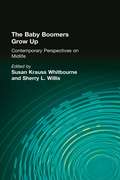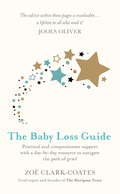- Table View
- List View
The Autistic Spectrum: Revised edition
by Ms Lorna Wing'Authoritative, compassionate and commonsensical . . . an honest, sensitive and thorough introduction to understanding and living with autism . . . highly recommended.' - Psychological Medicine'Packed with down to earth, practical ideas . . . readable, interesting . . . informative . . . if you buy only one title about autism this year it should be this one.' - Collette Dritte, Nursery WorldOver 500,000 people of all ages in the UK have disorders in the autistic spectrum. About one-third also have varying degrees of learning difficulty. All have impairment of social interaction, communication and imagination - the world appears a bewildering and sometimes frightening place. This acclaimed, authoritative guide explains how people with autism experience the world and why they need an organized, structured environment, presenting a window into the world of those with the disorder. Wing suggests ways of improving communication, developing abilities and widening social interaction, and how to cope with stresses within the family.
The Autistic Subject: On the Threshold of Language (The Palgrave Lacan Series)
by Leon S. BrennerThis book presents a theory of autistic subjectivity from a Lacanian psychoanalytic perspective. Dr. Brenner describes autism as a singular mode of being that is fundamentally linked to one’s identity and basic practices of existence, offering a rigorous alternative to treating autism as a mental or physical disorder. Drawing on Freud and Lacan’s psychoanalytic understanding of the subject, Brenner outlines the unique features of the autistic subjective structure and provides a comprehensive synthesis of contemporary work on the psychoanalysis of autism. The book examines research by theorists including Jean-Claude Maleval, Éric Laurent, Rosine and Robert Lefort that has been largely unavailable to Anglophone audiences until now. In this book autism is posited to be a singular subjective structure not reducible to neurosis or psychosis. In accordance with the Lacanian approach, autism is examined with detailed attention to the subject’s use of language, culminating in Brenner’s “autistic linguistic spectrum.” A compelling read for students and scholars of psychoanalysis and autism researchers and clinicians.
The Autistic Survival Guide to Therapy
by Steph JonesThe ultimate autistic survival guide to therapy"This is the book that would've saved me nine different therapists, decades of self-analysis, thousands of pounds, twelve different doctors and untold amounts of pain, frustration and trauma - in spending a lifetime looking for the right answers in the wrong places I've become an accidental expert."In this candid, witty and insightful exploration into therapy, Steph Jones uses her professional and lived experiences as a late diagnosed autistic woman and therapist, as well as consulting therapists from across the world and tapping into the autistic community, to create the ultimate autistic survival guide to therapy.Steph confronts the statistics, inadequate practices and ableist therapists head on and poses the questions of how we can make therapy neurodivergence-affirming and how to create safe spaces for autistic individuals. With strategic and practical advice to help recognise the 'red flags' of a dodgy therapist and provide a clear roadmap to finding your confidence and setting the appropriate boundaries with a new therapist, Steph has every question answered.To support therapists striving for inclusivity and a neurodiverse affirming practice, the inclusion of a context guide provides a deconstruction of each therapy session so you can recognise how undiagnosed (or diagnosed) autism may present itself during therapy and how you can start to explore this in the therapeutic space.(P) 2024 Jessica Kingsley Publishers
The Autistic Survival Guide to Therapy
by Steph Jones"This is the book that would've saved me nine different therapists, decades of self-analysis, thousands of pounds, twelve different doctors and untold amounts of pain, frustration and trauma - in spending a lifetime looking for the right answers in the wrong places I've become an accidental expert."In this candid, witty and insightful exploration into therapy, Steph Jones uses her professional and lived experiences as a late diagnosed autistic woman and therapist, as well as consulting therapists from across the world and tapping into the autistic community, to create the ultimate autistic survival guide to therapy.Steph confronts the statistics, inadequate practices and ableist therapists head on and poses the questions of how we can make therapy neurodivergence-affirming and how to create safe spaces for autistic individuals. With strategic and practical advice to help recognise the 'red flags' of a dodgy therapist and provide a clear roadmap to finding your confidence and setting the appropriate boundaries with a new therapist, Steph has every question answered.To support therapists striving for inclusivity and a neurodiverse affirming practice, the inclusion of a context guide provides a deconstruction of each therapy session so you can recognise how undiagnosed (or diagnosed) autism may present itself during therapy and how you can start to explore this in the therapeutic space.
The Autistic Trans Guide to Life
by Wenn B. Lawson Yenn PurkisThis essential survival guide gives autistic trans and/or non-binary adults all the tools and strategies they need to live as their very best self.Blending personal accounts with evidence-based insights and up-to-date information, and written from a perspective of empowerment and self-acceptance, the book promotes pride, strength and authenticity, covering topics including self-advocacy, mental health and camouflaging and masking as well as key moments in life such as coming out or transitioning socially and/or physically. Written by two leading autistic trans activists, this book honestly charts what life is like as an autistic trans person and is vital, life-affirming reading.
The Autistic's Guide to Self-Discovery: Flourishing as a Neurodivergent Adult
by Sol SmithLive Authentically and Function Effectively in All Areas of Your Life In this first-of-its-kind book, Sol Smith combines current research, his personal experience as a late-diagnosed autistic adult, and lessons learned as an educator to show how you can transcend common mischaracterizations, overcome shame, and gain the skills to flourish. Sol knows that neurodivergent people often feel that nothing they have been taught relates to how they experience the world. To resolve this conflict, they try to change or mask who they are, which can cause isolation, depression, and anxiety. He advises the opposite: Understand yourself, accept yourself, and reduce conflict. Designed to help you peel away the shell of inadequacy and self-blame that often comes with neurodivergence, The Autistic’s Guide to Self-Discovery offers the necessary tools and knowledge to function effectively at home, at work, and in the wider world.
The Autobiography of Alexander Luria: A Dialogue with The Making of Mind
by Michael Cole Karl Levitin Alexander R. LuriaAlexander Luria was one of the most influential psychologists of the 20th century. His official autobiography was written as a citizen of the Soviet Union, and while it provides a compelling story of his lifelong devotion to developing a comprehensive theory of the biological and cultural foundations of human nature, it is conspicuous for the absence of information about the social context of his work and his personal struggles to be a decent person in indecent times. The current "dialogic autobiography" brings the vitality of Luria's ideas back to life. Michael Cole and Karl Levitin, both of whom knew Luria well and have written about his life and work, have written a carefully researched introduction and epilogue to the original autobiography. They provide readers, for the first time, with information about the social and personal contexts of Luria's remarkable achievements. Their account is supplemented by downloadable resources with reminiscences of leading psychologists from around the world who knew and worked with Luria. At last, Luria's life and science are brought together in a single volume.The book will appeal to psychologists, neuropsychologists, and other scientists interested in Luria's life achievements.
The Autobiography: The Sunday Times Bestseller
by Sir Alastair CookGet to know England legend Alastair Cook in his fascinating and remarkably honest autobiography'He is England's greatest ever batsman . . . a hugely enjoyable book' Daily Mail_________Watch. The. Ball.It's just you. Standing at the crease. Waiting. The bowler is running. His arm swinging. The ball - 155 grams of cork, string and leather - is hurled at you. At 90 mph it travels 22 yards in under half a second. You can barely see it and you've got to be swinging your bat before it's halfway towards you. Because you are in its path . . . Alastair Cook, one of England's most decorated players and highest test run scorer, knows what it is like to be your best under pressure. Yet at 33 he called time on his England career.Come with him as he relives the fraught hours on the pitch, the desperate lows and astonishing highs, the paralysing anxiety that can send the best back home and the extraordinary battle of wills with yourself, the opposing players and even those supposedly on your own side.This is cricket as you've never seen it. The view from the inside . . ._________'Fascinating, timely. Delves into the psychological challenges of the game' Guardian'Bracingly honest' Times
The Autoimmune Cure
by Sara GottfriedNew York Times bestselling author Dr Sara Szal Gottfried reveals how trauma can rewire your body to trigger autoimmune diseases - and provides a comprehensive plan to reset your immune system and finally healWe know that autoimmune disease - a condition when the body's immune system attacks its own healthy tissue and cells - affects millions of people worldwide. But as New York Times bestselling author Dr Gottfried explains in this eye-opening new book, autoimmune disease may be even more pervasive than we realise - and its cause may surprise you.Conventional medicine falls short when it comes to both diagnosing and treating autoimmune disease. Many people suffer from mysterious symptoms like severe fatigue, brain fog, aches and pains, feelings of tingling and numbness, stubborn weight gain, abdominal pain, digestive problems, hair loss, insomnia, and even anxiety, and don't realize their immune system is at the root of their symptoms. In her precision medicine practice, Dr Gottfried noticed a seemingly unusual pattern: many of her patients who suffer from autoimmune disease and symptoms have a history of trauma. Emerging research shows that up to 80 per cent of patients with autoimmune disease experienced significant emotional distress before getting sick.With The Autoimmune Cure, there is hope on the horizon for the tens of millions of people who suffer from autoimmune disease. Dr Gottfried has created a powerful programme designed to break the vicious cycle of autoimmune disease, reset your immune system and restore your health, with advice on diet, sleep, supplements, breathwork, microbiome restoration, somatic therapy and much more.The Autoimmune Cure offers a road map to lasting relief from autoimmune disease by addressing the underlying cause of the condition and healing the body, mind and spirit.
The Autoimmune Cure: Healing The Trauma And Other Triggers That Have Turned Your Body Against You
by Sara GottfriedNew York Times bestselling author Dr Sara Szal Gottfried reveals how trauma can rewire your body to trigger autoimmune diseases - and provides a comprehensive plan to reset your immune system and finally healWe know that autoimmune disease - a condition when the body's immune system attacks its own healthy tissue and cells - affects millions of people worldwide. But as New York Times bestselling author Dr Gottfried explains in this eye-opening new book, autoimmune disease may be even more pervasive than we realise - and its cause may surprise you.Conventional medicine falls short when it comes to both diagnosing and treating autoimmune disease. Many people suffer from mysterious symptoms like severe fatigue, brain fog, aches and pains, feelings of tingling and numbness, stubborn weight gain, abdominal pain, digestive problems, hair loss, insomnia, and even anxiety, and don't realize their immune system is at the root of their symptoms. In her precision medicine practice, Dr Gottfried noticed a seemingly unusual pattern: many of her patients who suffer from autoimmune disease and symptoms have a history of trauma. Emerging research shows that up to 80 per cent of patients with autoimmune disease experienced significant emotional distress before getting sick.With The Autoimmune Cure, there is hope on the horizon for the tens of millions of people who suffer from autoimmune disease. Dr Gottfried has created a powerful programme designed to break the vicious cycle of autoimmune disease, reset your immune system and restore your health, with advice on diet, sleep, supplements, breathwork, microbiome restoration, somatic therapy and much more.The Autoimmune Cure offers a road map to lasting relief from autoimmune disease by addressing the underlying cause of the condition and healing the body, mind and spirit.
The Autoimmune Cure: Healing the Trauma and Other Triggers That Have Turned Your Body Against You
by Sara Szal Gottfried M.D.New York Times bestselling author Dr. Sara Gottfried reveals how trauma can rewire your body to trigger autoimmune diseases—and provides a comprehensive plan to reset your immune system and finally heal.We know that autoimmune disease—a condition when the body’s immune system attacks its own healthy tissue and cells—affects about one in ten Americans, or 24 million people, with prevalence increasing worldwide. But as New York Times bestselling author Dr. Sara Gottfried explains in this eye-opening new book, autoimmune disease may be even more pervasive than we realize—and its root cause may surprise you.Conventional medicine falls short when it comes to both diagnosing and treating autoimmune disease. Many people suffer from mysterious symptoms—like severe fatigue, brain fog, aches and pains, feelings of tingling and numbness, stubborn weight gain, abdominal pain, digestive problems, hair loss, insomnia, and even anxiety—and don’t realize their immune system is at the root of their symptoms. In her precision medicine practice, Dr. Gottfried noticed a seemingly unusual pattern: many of her patients who suffer from autoimmune disease and symptoms have a history of trauma. Emerging research shows that up to 80% of patients with autoimmune disease experienced significant emotional distress before getting sick.With The Autoimmune Cure, there is hope on the horizon for the tens of millions of people who suffer from autoimmune disease. Dr. Gottfried has created a powerful program designed to break the vicious cycle of autoimmune disease, reset your immune system, and restore your health, with advice on:dietsleepsupplementsbreathworkmicrobiome restorationsomatic therapyketamine-assisted treatmentmicrodosing psilocybinMDMA-assisted therapyThe Autoimmune Cure offers a roadmap to lasting relief from autoimmune disease by addressing the root cause of the condition and healing the body, mind, and spirit.
The Automaticity of Everyday Life: Advances in Social Cognition, Volume X (Advances in Social Cognition Series #Vol. 10)
by Robert S. WyerAs Skinner argued so pointedly, the more we know about the situational causes of psychological phenomena, the less need we have for postulating internal conscious mediating processes to explain those phenomena. Now, as the purview of social psychology is precisely to discover those situational causes of thinking, feeling, and acting in the real or implied presence of other people, it is hard to escape the forecast that as knowledge progresses regarding social psychological phenomena there will be less of a role played by free will or conscious choice in accounting for them. In other words, because of social psychology's natural focus on the situational determinants of thinking, feeling, and doing, it is inevitable that social psychological phenomena increasingly will be found to be automatic in nature. This 10th book in the series addresses automaticity and how it relates to social behavior. The lead article, written by John Bargh, argues that social psychology phenomena are essentially automatic in nature, as opposed to being mediated by conscious choice or reflection. Bargh maintains that an automatic mental phenomenon is that which occurs reflexively whenever certain triggering conditions are in place; when those conditions are present, the process runs off autonomously, independently of conscious guidance. In his lead article, he focuses on these preconscious automatic processes that can be contrasted with postconscious and goal-dependent forms of automaticity which depend on more than the mere presence of environmental objects or events. Because social psychology, like automaticity theory and research, is also largely concerned with phenomena that occur whenever certain situational features or factors are in place, social psychology phenomena are essentially automatic. Students and researchers in social and cognitive psychology will find this to be a provocative addition to the series.
The Autonomous Brain: A Neural Theory of Attention and Learning
by Peter M. MilnerThe behaviorist credo that animals are devices for translating sensory input into appropriate responses dies hard. The thesis of this pathbreaking book is that the brain is innately constructed to initiate behaviors likely to promote the survival of the species, and to sensitize sensory systems to stimuli required for those behaviors. Animals attend innately to vital stimuli (reinforcers) and the more advanced animals learn to attend to related stimuli as well. Thus, the centrifugal attentional components of sensory systems are as important for learned behavior as the more conventional paths. It is hypothesized that the basal ganglia are an important source of response plans and attentional signals. This reversal of traditional learning theory, along with the rapid expansion of knowledge about the brain, especially that acquired by improved techniques for recording neural activity in behaving animals and people, makes it possible to re-examine some long standing psychological problems. One such problem is how the intention to perform an act selects sensory input from relevant objects and ensures that it alone is delivered to the motor system to control the intended response. This is an aspect of what is sometimes known as the binding problem: how the different features of an observed object are integrated into a unified percept. Another problem that has never been satisfactorily addressed is how the brain stores information concerning temporal order, a requirement for the production of most learned responses, including pronouncing and writing words. A fundamental process, the association between brain activities representing external events, is surprisingly poorly understood at the neural level. Most concepts have multiple associations but the concept is not unduly corrupted by them, and usually only a single appropriate association is aroused at a time. Furthermore, any arbitrary pair of concepts can be instantly associated, apparently requiring an impossibly high degree of neural interconnection. The author suggests a substitute for the reverberating closed neuronal loop as an explanation for the engram (active memory trace or working memory), which may go some way to resolving these difficulties. Shedding new light on enduring questions, The Autonomous Brain will be welcomed by a broad audience of behavioral and brain scientists.
The Avatar Faculty: Ecstatic Transformations in Religion and Video Games (Ethnographic Studies in Subjectivity #16)
by Jeffrey G. SnodgrassThe Avatar Faculty creatively examines the parallels between spiritual and digital activities to explore the roles that symbolic second selves—avatars—can play in our lives. The use of avatars can allow for what anthropologists call ecstasy, from the Greek ekstasis, meaning "standing outside oneself." The archaic techniques of promoting spiritual ecstasy, which remain central to religious healing traditions around the world, now also have contemporary analogues in virtual worlds found on the internet. In this innovative book, Jeffrey G. Snodgrass argues that avatars allow for the ecstatic projection of consciousness into alternate realities, potentially providing both the spiritually possessed and gamers access to superior secondary identities with elevated social standing. Even if only temporary, self-transformations of these kinds can help reduce psychosocial stress and positively improve health and well-being.
The Awakened Brain: The New Science of Spirituality and Our Quest for an Inspired Life
by Lisa MillerA groundbreaking exploration of the neuroscience of spirituality and a bold new paradigm for health, healing, and resilience—from a New York Times bestselling author and award-winning researcher &“A new revolution of health and well-being and a testament to, and celebration of, the power within.&”—Deepak Chopra, MDWhether it&’s meditation or a walk in nature, reading a sacred text or saying a prayer, there are many ways to tap into a heightened awareness of the world around you and your place in it. In The Awakened Brain, psychologist Dr. Lisa Miller shows you how. Weaving her own deeply personal journey of awakening with her groundbreaking research, Dr. Miller&’s book reveals that humans are universally equipped with a capacity for spirituality, and that our brains become more resilient and robust as a result of it. For leaders in business and government, truth-seekers, parents, healers, educators, and any person confronting life&’s biggest questions, The Awakened Brain combines cutting-edge science (from MRI studies to genetic research, epidemiology, and more) with on-the-ground application for people of all ages and from all walks of life, illuminating the surprising science of spirituality and how to engage it in our lives: • The awakened decision is the better decision. With an awakened perception, we are more creative, collaborative, ethical, and innovative. • The awakened brain is the healthier brain. An engaged spiritual life enhances grit, optimism, and resilience while providing insulation against addiction, trauma, and depression. • The awakened life is the inspired life. Loss, uncertainty, and even trauma are the gateways by which we are invited to move beyond merely coping with hardship to transcend into a life of renewal, healing, joy, and fulfillment. Absorbing, uplifting, and ultimately enlightening, The Awakened Brain is a conversation-starting saga of scientific discovery packed with counterintuitive findings and practical advice on concrete ways to access your innate spirituality and build a life of meaning and contribution.
The Awakened Family: A Revolution in Parenting
by Shefali Tsabary"Parents . . . you will be wowed and awed by [Dr. Shefali]." --Oprah WinfreyNew from the New York Times bestselling author of The Conscious Parent comes a radically transformative plan that shows parents how to raise children to be their best, truest selves.What if...? What if I told you that you can put an end to all of your parenting struggles? That you can learn to parent without fear or anxiety? That you can end conflict with your children? That you can create close and connected relationships within your family? ...Would you accept this invitation to a revolution in parenting? We all have the capacity to raise children who are highly resilient and emotionally connected. However, many of us are unable to because we are blinded by modern misconceptions of parenting and our own inner limitations. In The Awakened Family, I show you how you can cultivate a relationship with your children so they can thrive; moreover, you can be transformed to a state of greater calm, compassion and wisdom as well. This book will take you on a journey to transcending your fears and illusions around parenting and help you become the parent you always wanted to be: fully present and conscious. It will arm you with practical, hands-on strategies and real-life examples from my experience as a parent and clinical psychologist that show the extraordinary power of being a conscious parent. Everyone in your family is ready to be awakened. Will you take this journey with me?--ShefaliFrom the Hardcover edition.
The Awakened Family: How to Raise Empowered, Resilient, and Conscious Children.
by Dr Shefali Tsabary'Parents ... you will be wowed and awed by [Dr. Shefali].' - Oprah WinfreyBecome the awakened parent you've always wanted to be and watch your children thrive.All parents have aspirations for their children but for some these hopes turn into unrealistic expectations. In many cases, this puts huge amounts of pressure on children and has the potential to cause real harm, hindering your child's development. Challenging modern myths on how kids should be, Dr Shefali helps parents recognise children for who they truly are instead of holding onto society's impossible ideals.Drawing on Eastern philosophy as well as Western psychology, Dr Shefali offers enlightened, practical advice and explains her radically transformative plan which guarantees that you have confident children and a calm and emotionally connected family.
The Awakened Family: How to Raise Empowered, Resilient, and Conscious Children.
by Dr Shefali TsabaryDr Shefali teaches us how to control our expectations, embrace the present moment, and let go of the anxiety surrounding how best to parent our children.Become the awakened parent you've always wanted to be and watch your children thrive.All parents have aspirations for their children but for some these hopes turn into unrealistic expectations. In many cases, this puts huge amounts of pressure on children and has the potential to cause real harm, hindering your child's development. Challenging modern myths on how kids should be, Dr Shefali helps parents recognise children for who they truly are instead of holding onto society's impossible ideals.Drawing on Eastern philosophy as well as Western psychology, Dr Shefali offers enlightened, practical advice and explains her radically transformative plan which guarantees that you have confident children and a calm and emotionally connected family.(P)2017 Penguin Random House Audio
The Awakened Ones: Phenomenology of Visionary Experience
by Gananath ObeyesekereWhile a rational consciousness grasps many truths, Gananath Obeyesekere believes an even richer knowledge is possible through a bold confrontation with the stuff of visions and dreams. Spanning both Buddhist and European forms of visionary experience, he fearlessly pursues the symbolic, nonrational depths of such phenomena, reawakening the intuitive, creative impulses that power greater understanding.Throughout his career, Obeyesekere has combined psychoanalysis and anthropology to illuminate the relationship between personal symbolism and religious experience. In this book, he begins with Buddha's visionary trances wherein, over the course of four hours, he witnesses hundreds of thousands of his past births and eons of world evolution, renewal, and disappearance. He then connects this fracturing of empirical and visionary time to the realm of space, considering the experience of a female Christian penitent, who stares devotedly at a tiny crucifix only to see the space around it expand to mirror Christ's suffering. Obeyesekere follows the unconscious motivations underlying rapture, the fantastical consumption of Christ's body and blood, and body mutilation and levitation, bridging medieval Catholicism and the movements of early modern thought as reflected in William Blake's artistic visions and poetic dreams. He develops the term "dream-ego" through a discussion of visionary journeys, Carl Jung's and Sigmund Freud's scientific dreaming, and the cosmic and erotic dream-visions of New Age virtuosos, and he defines the parameters of a visionary mode of knowledge that provides a more elastic understanding of truth. A career-culminating work, this volume translates the epistemology of Hindu and Buddhist thinkers for western audiences while revitalizing western philosophical and scientific inquiry.
The Awakened Therapist: Spirituality, Consciousness, and Subtle Energy in Gestalt Therapy
by Harmony KwikerThe Awakened Therapist is an accessible introduction to gestalt therapy through the lens of transpersonal counseling, one that offers a clear and profound account of how to bridge the gap between traditional counseling and spiritual transformation. Bringing new depths to the art of therapy, Harmony Kwiker provides a map for therapists to dismantle the old paradigm of therapist-as-expert and honor their clients’ innate wisdom. The chapters seamlessly weave together elusive concepts of levels of awareness, subtle energy, and spiritual alignment with psychological concepts that are embedded in the theory and application of gestalt therapy. After reading this book, therapists will be inspired and energized while having more substantial breakthroughs with their clients.
The Awakening Earth: Our Next Evolutionary Leap (Routledge Library Editions: Evolution #11)
by Peter RussellOriginally published in 1982 The Awakening Earth explores the idea of the Earth as a collective, self-regulatory living organism, and considers in this context, the function of the human race. The book provides an exploration of humanity’s potential and explores the possibility of mankind’s evolutionary future. Drawing on the work of physicists, psychologists, philosophers and mystics, the book argues that humanity is on the verge of another evolutionary leap and explores evolution in the context of spiritual growth, arguing that widespread inner awakenings could lead to a more analogous society, functioning as a single social super-organism, much in the way cells in a body function as a biological organism.
The BFRB Recovery Workbook: Effective Recovery from Hair Pulling, Skin Picking, Nail Biting, and Other Body-Focused Repetitive Behaviors
by Dr. Marla Deibler Dr Dr. Renae ReinardySo, you want to work on recovery from your body-focused repetitive behavior (BFRB)? Chances are, this is not the first time you've thought about changing your BFRB. And it's probably not the first time you've taken action to overcome it.This workbook provides evidence-based tools consistent with the most up-to-date behavioral science to examine your BFRB in a new way, shift perspective on how you relate to your BFRB experience, reduce the behavior with individually tailored interventions, and transform your life and sense of self for the better.Written by licensed clinical psychologists, this integrative behavioral therapy (IBT) approach is rooted in behavioral and cognitive psychology, utilizing CBT, ACT, DBT and habit reversal training, and is applicable to all BFRBs, including nail biting, hair pulling, and skin picking. Make your way through the workbook at your own pace, with the authors' compassionate guidance, and return to it as often as needed.
The Baby Boomers Grow Up: Contemporary Perspectives on Midlife
by Susan Krauss Whitbourne Sherry L. WillisThe goal of this volume is to examine development in middle age from the perspective of baby boomers -- a unique cohort in the United States defined as those individuals born from 1946 to 1962. This is the largest cohort ever to enter middle age in Western society, and they currently represent approximately one-third of the total U.S. population. The Baby Boomers Grow Up provides contemporary and comprehensive perspectives of development of the baby boomer cohort as they proceed through midlife. Baby boomers continue to exert a powerful impact on the media, fiction, movies, and even popular music, just as they were an imposing force in society from the time of their entry into youth. As these individuals enter the years normally considered to represent midlife, they are redefining how we as a society regard adults in their middle and later years. This volume features several unique aspects. First, the literature reviewed focuses specifically on research relevant to baby boomers and their development as adults, rather than a global perspective on middle age. Second, the volume takes into account the diversity within the boomer cohort, such as social class, race, and education. In addition, quantitative and qualitative developmental changes occurring from the forties to the fifties and the sixties are considered. Differences in leading and trailing edge boomers are likewise addressed. Ideal for researchers in adult development and graduate seminars on adult development, The Baby Boomers Grow Up will also appeal to adult educators, human resource personnel, health professionals and service providers, and clinical psychologists and counselors.
The Baby Loss Guide: Practical and compassionate support with a day-by-day resource to navigate the path of grief
by Zoë Clark-CoatesWritten by one of the world's leading baby loss support experts, The Baby Loss Guide is designed to help you navigate this complex issue. Whether you have personally encountered loss, or are supporting people through this harrowing time, this book provides practical and compassionate advice.Zoe and her husband Andy have personally faced the loss of five babies. Out of their experiences came the charity The Mariposa Trust (more often known by its primary division Saying Goodbye), offering support to thousands of grieving parents and relatives around the world each week. In her first bestselling book, Saying Goodbye, Zoe wrote a moving account of their experiences and how they found a way through loss.In The Baby Loss Guide Zoe provides a supportive and practical guide to walk people through their darkest days of suffering and give them hope for the future. The first half of the book answers the many questions those who encounter loss ask themselves and others, which until now have resulted in people spending hours exploring the internet to gain answers and insight. It is interlaced with personal stories from both men and women who have been there, and tackles the many myths, taboos and assumptions around loss. It also provides clear guidance and advice on how to navigate life following your world imploding, such as: How do I return to work? How do I know if or when I should try again for more children? How do I communicate with my partner about loss?The second half of the book offers 60-days of practical and compassionate support. Whether someone's loss is recent or historic, this support is a precious gift that will help an individual walk the scary path of grief. Zoe's friendly and down to earth approach means she removes the often over used medical terminology, and this makes The Baby Loss Guide readable, easy to absorb and a vital source of information and help.
The Baby Loss Guide: Practical and compassionate support with a day-by-day resource to navigate the path of grief
by Zoë Clark-CoatesWritten by one of the world's leading baby loss support experts, The Baby Loss Guide is designed to help you navigate this complex issue. Whether you have personally encountered loss, or are supporting people through this harrowing time, this book provides practical and compassionate advice. Zoe and her husband Andy have personally faced the loss of five babies. Out of their experiences came the charity The Mariposa Trust (more often known by its primary division Saying Goodbye), offering support to thousands of grieving parents and relatives around the world each week. In her first bestselling book Saying Goodbye Zoe wrote a moving account of their experiences and how they found a way through loss.In The Baby Loss Guide Zoe provides a supportive and practical guide to walk people through their darkest days of suffering and gives them hope for the future. The first half of the book answers the many questions those who encounter loss ask themselves and others, and until now have resulted in people spending hours exploring the internet to gain answers and insight. It is interlaced with personal stories from both men and women who have been there, and tackles the many myths, taboos and assumptions around loss. It also provides clear guidance and advice on how to navigate life following your world imploding, such as: How do I return to work? How do I know if or when I should try again for more children? How do I communicate with my partner about loss?The second half of the book offers 60-days of practical and compassionate support. Whether someone's loss be recent or historic, this support will be a wonderful gift, and will help the person walk the scary path of grief. Zoe's friendly and down to earth approach means she removes the often over used medical terminology, and this makes The Baby Loss Guide readable, easy to absorb and a vital source of information and help.
